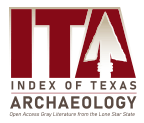Home > Research Projects and Centers > Center for Regional Heritage Research > Index of Texas Archaeology > Vol.
Article Title
A Cultural Resources Survey for the Leon Valley Hike and Bike Trail Project, Bexar County, Texas
Agency
Texas Historical Commission
Abstract
In early March, 2014, South Texas Archeological Research Services, LLC, conducted a cultural resources survey for the Leon Valley Hike and Bike Trail Project, Bexar County, Texas. The survey focused on discovery and preliminary assessment of archeological resources but also included an estimation of effect to the Huebner-Onion Homestead and Stage Coach Stop Site (41BX1429), which was listed in the National Register of Historic Places.
Since the project area was owned by the City of Leon Valley and the project involved federal funding through the Texas Department of Transportation, compliance with the Antiquities Code of Texas and Section 106 of the National Historic Preservation Act was triggered for the project. The survey was conducted according to applicable professional standards and guidelines under Texas Antiquities Permit 6803. Portions of the project area that were previously investigated were not included in the survey, and portions of the area were revised or omitted after completion of the survey.
The project, as ultimately revised, consisted of replacement of existing trails, additions of new trails, and construction of concrete bridges at three creek crossings. Not including portions previously examined, the final revised footprint of the area of potential effects to cultural resources for the project was about 1.6 acres of trail rightof-way about 3,500 feet long and 20 feet wide. Except at the creek crossings, where some deeper cutting and filling would be needed, the average anticipated depth of impact for the project was about 6-12 inches. The area of potential effects for indirect effects to non-archeological cultural resources was the area within about 100 feet of the final proposed trail routes not previously surveyed.
Background searches revealed that except for prehistoric archeological site 41BX1879, found near the project area in 2012 and later determined ineligible, and the Huebner-Onion Site, no cultural resources were within a kilometer radius of the survey area. Field conditions within most of the area surveyed precluded effective visual surface examination, but patchy surface exposures in the uplands and exposed profiles along Huebner Creek were inspected. Because of shallow soils within most of the area and access limitations, archeological backhoe trenching was neither feasible nor warranted. Sixteen archeological shovel tests were excavated throughout the survey area. Shallow clay soils over limestone or caliche bedrock, or dense clay substrate, were encountered in most of the tests. No archeological evidence was found during the survey and nothing was collected or curated.
The Principal Investigator believed that construction of the proposed trail, as finally revised, should not affect any archeological resources. Based on the research and findings a consulting architectural historian and on all revisions to the project plans made to time of this report in June, 2014, the Principal Investigator and architectural historian believed that the project would have no adverse effect on the Huebner-Onion Site.
A local historical icon within the survey area, the marker for the presumed gravesite of prominent nineteenth-century settler and stockman Joseph Huebner (1823-1882), was neither listed nor eligible as a landmark. In May, 2014, the segment of the proposed trail leading from the main east-west trail southward to the marker was omitted from the project by the City of Leon Valley, thereby obviating the need for further cultural resource investigations for that segment. Prior to omission, visual inspection and excavation of two archeological shovel tests within the footprint of the segment found no cultural evidence.
It was recommended to the City of Leon Valley and its consultants, the Texas Historical Commission, and the Texas Department of Transportation that the project as revised should proceed without further archeological or other cultural resource compliance work, except in the event that cultural resources not found during the survey were found during project-related construction activities. Per applicable statutes and regulations, it was also recommended that in the event of such finds, work should immediately be halted in the vicinity until the finds were examined and evaluated by a qualified archeological consultant and/or the Commission and the Department.
Creative Commons License

This work is licensed under a Creative Commons Attribution-NonCommercial 4.0 International License
Included in
American Material Culture Commons, Archaeological Anthropology Commons, Environmental Studies Commons, Other American Studies Commons, Other Arts and Humanities Commons, Other History of Art, Architecture, and Archaeology Commons, United States History Commons
Submission Location
Tell us how this article helped you.


